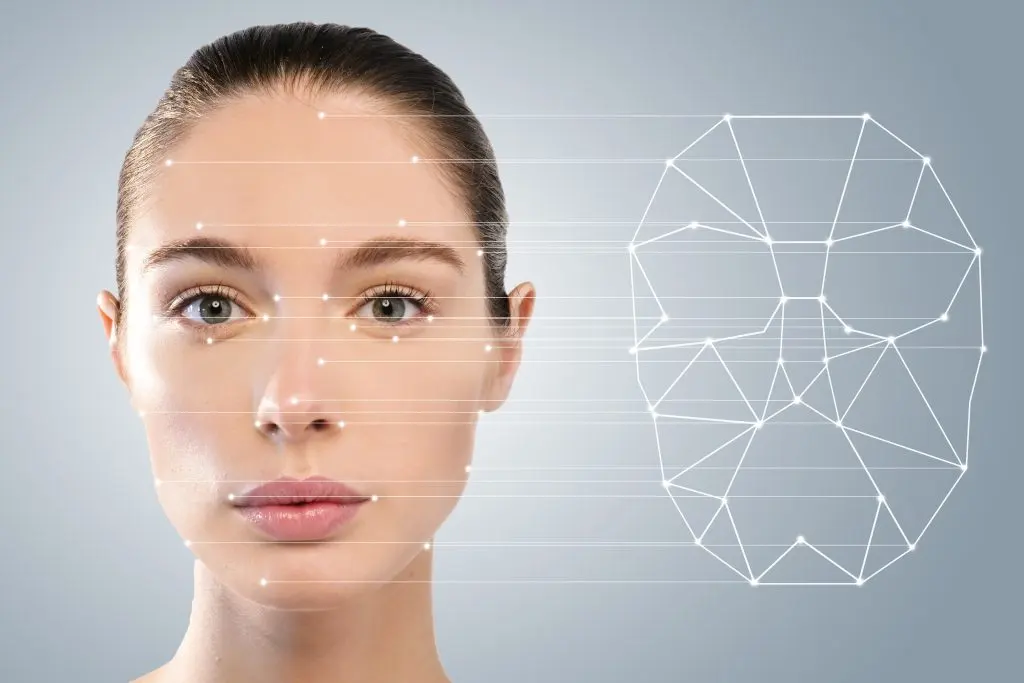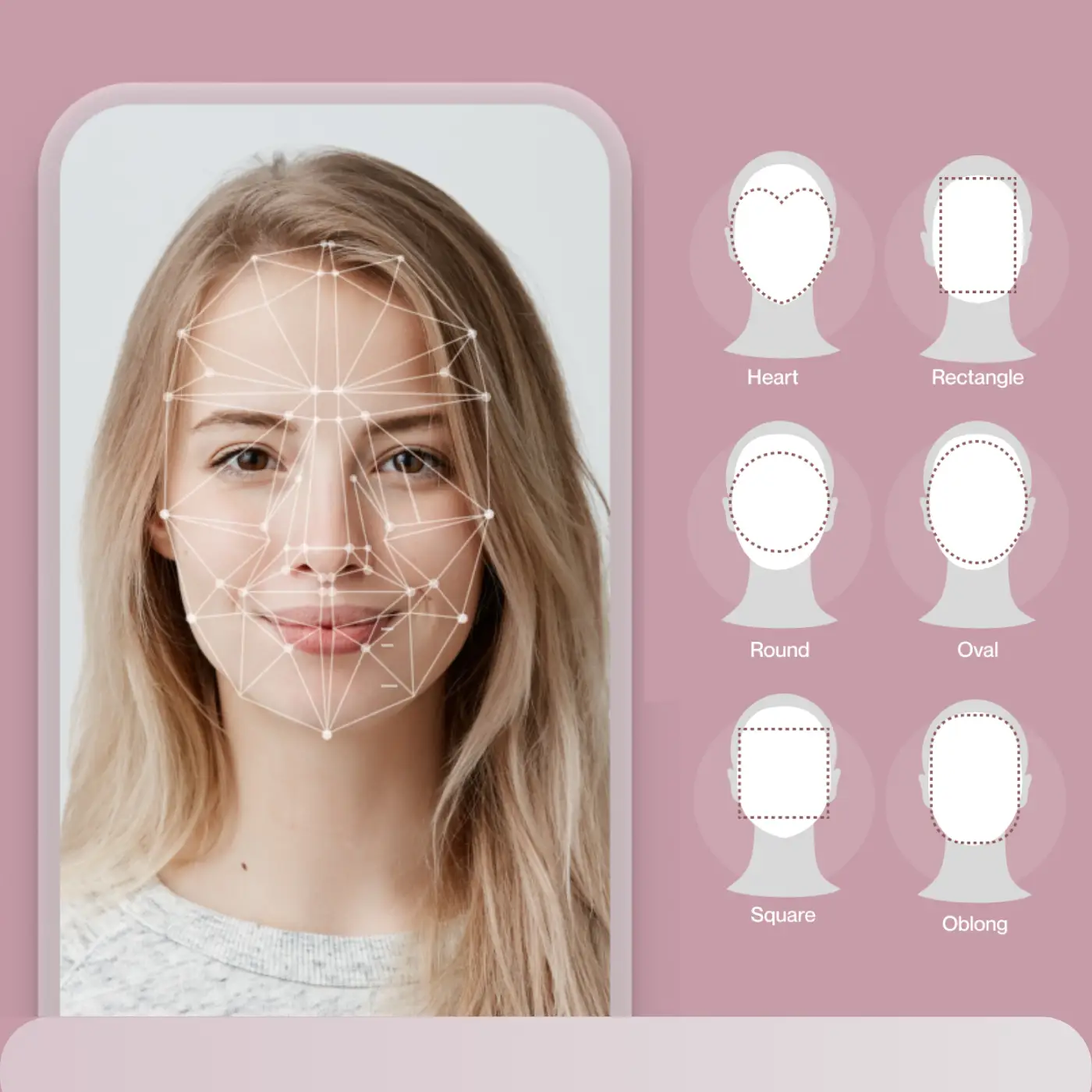Determining customers’ face shapes traditionally meant relying on manual assessments or lengthy surveys – a process that costs beauty brands valuable time and customer engagement.
Recognizing this friction point, forward-thinking beauty and cosmetic brands are turning to AI-driven face shape identifiers.
These advanced tools not only streamline the face shape identification process but also significantly improve customer satisfaction. And with it, increase conversions and deliver valuable consumer insights for your brand.
In this article, we’ll explore how AI face shape detection surpasses traditional methods in both efficiency and accuracy, and why beauty brands increasingly choose AI to boost their customer experiences, marketing effectiveness, and overall business performance.
Key takeaways:
- Traditional face shapes tests are subjective, inaccurate, and harm customer satisfaction.
- AI face shape detection ensures precise, scalable beauty personalization, boosting engagement and conversions.
- Integrating AI into virtual try-ons boosts customer confidence and reduces returns.
- AI-driven solutions provide valuable insights into customer behaviors, preferences, and trends.
- Adopting AI positions your brand as an industry innovator, enhancing your competitive edge.
- Does your brand really need an AI face shape identifier?
- Limitations of traditional face shape tests for beauty brands
- Emergence of AI face shape identifier: A better solution for beauty brands
- Advantages of AI face shape identifiers for beauty brands
- Integrating face shape into your virtual try-on
- Explore what AI face shape identifier can do for you
Does your brand really need an AI face shape identifier?
So, is implementing AI face shape identification truly necessary for your beauty brand? In short, yes.
AI face shape identifiers are far more than a technological trend; they’re strategic business tools responding directly to the growing consumer demand for personalized beauty experiences.
We’ve said it plenty of times before, and we’ll say it again: in today’s highly competitive beauty landscape, personalization is fundamental for increasing customer satisfaction, loyalty, and ultimately, your brand’s profitability.

So, here’s why your brand should prioritize integrating AI face shape technology.
⦿ Boost customer engagement
AI face shape identifiers enable brands to offer highly personalized recommendations that resonate deeply with consumers. Tailored product suggestions based on precise facial measurements capture attention, extend interactions, and drive more conversions.
⦿ Increase product relevance and conversions
AI-driven facial analysis ensures accurate product recommendations – be it makeup, skincare, or styling – specifically tailored to your customers’ unique facial structures. Customers who feel personally addressed by your brand are significantly more likely to purchase.
⦿ Streamline the buying journey
AI simplifies and accelerates the consumer journey. By eliminating guesswork and immediately providing personalized product suggestions, your brand reduces decision fatigue – a major barrier to cosmetic sales – and increases online purchase confidence.
⦿ Gain valuable customer insights
Every interaction with an AI face shape identifier generates critical data about your customers’ preferences, behaviors, and trends. These insights empower your brand to refine products, enhance targeted marketing campaigns, and elevate both digital and in-store customer experiences.
⦿ Build lasting brand loyalty
In a market crowded with cosmetic options, brands that consistently deliver personalized, relevant experiences gain a competitive edge. Customers return to brands that understand and respond precisely to their individual needs, fostering long-term loyalty.
Next, let’s compare the limitations of traditional face shapes tests with the precision and effectiveness of AI-powered face shape identifier.
Limitations of traditional face shape tests for beauty brands
Before the adoption of AI technology, beauty brands relied primarily on traditional face shape assessment methods
These involve subjective self-assessments or visual comparisons against simplified diagrams. While these approaches were once standard, they now present significant limitations for cosmetic businesses looking to scale personalization efforts effectively.
These methods require the individual to make judgments about their features, which can lead to inaccuracies due to the subjective nature of self-assessment and the limited options provided by quizzes.
➥ Challenges of self-assessment
Traditional self-assessment quizzes require customers to categorize their facial features (oval, round, square, heart) based solely on their own perception. However, personal biases and misunderstandings often lead to inaccuracies.
Customers frequently misinterpret or misjudge their facial characteristics, resulting in mismatched product recommendations and decreased satisfaction with their purchases.

➥ Limitations of visual comparisons
Visual comparison methods have not been much better in terms of reliability.
These tests provided users with diagrams or images representing different face shapes, asking them to identify which shape most closely resembled their own.
However, oversimplified visual aids fail to capture the unique nuances of individual faces. This subjective method not only risks incorrect face shape identification but also diminishes customer confidence in your brand’s recommendations, potentially reducing conversions.

➥ Statistical insights
Although specific statistics on the inaccuracies of traditional face shape tests are scarce, studies in related fields suggest significant variability in self-assessment accuracy.
For instance, research in self-perceived body image shows that individuals often have a distorted perception of their own physical characteristics, which can similarly apply to facial feature recognition.
Business impacts of inaccurate assessments
Inaccurate face shape identification doesn’t just frustrate customers; it negatively impacts your brand’s bottom line. Misalignment between facial analysis and product recommendations leads to:
- Increased returns and exchanges
- Reduced customer satisfaction and trust
- Lower customer lifetime value (CLV)
Ultimately, relying on these traditional methods weakens your brand’s ability to deliver effective personalization and grow sustainably.
The limitations of traditional face shape assessments have highlighted the need for a more precise, reliable, and scalable approach, leading beauty brands directly toward AI-driven face shape identification tools.

➥ Explore our complete AI Face Shape Detection Guide and discover how your brand can leverage AI for more accurate, scalable, and profitable personalization.
Emergence of AI face shape identifier: A better solution for beauty brands
Recognizing the challenges and inaccuracies associated with traditional methods, leading beauty brands are increasingly turning to AI-driven face shape identifiers. These AI systems use complex algorithms and facial analysis technologies, providing a faster, more precise, and scalable solution for personalization.
The sophisticated algorithms measure distances, angles, and proportions between key facial landmarks (forehead, cheekbones, jawline, chin) to accurately determine an individual’s face shape in seconds.

This process, therefore, not only eliminates subjective user errors but significantly enhances the accuracy and reliability of facial analysis. As a result, beauty brands can confidently deliver personalized recommendations, increasing consumer trust and satisfaction.
Advantages of AI face shape identifiers for beauty brands
1. Objective and accurate analysis
Unlike subjective quizzes or visual comparisons, AI delivers precise, consistent face shape identification, removing human biases and drastically reducing inaccuracies. This ensures customers receive truly personalized product recommendations, increasing satisfaction and repeat purchases.

2. Instant, scalable personalization
AI can process thousands of analyses in real time, effortlessly scaling personalized recommendations to large customer segments. For brands, this means achieving personalized customer interactions at scale, efficiently catering to a growing customer base without added operational complexity.
3. Improved conversion rates
By accurately matching face shapes to tailored product recommendations, AI significantly boosts conversion rates. When customers see products specifically selected to flatter their unique facial features, purchasing decisions become simpler, increasing sales and reducing return rates.
4. Enhanced customer loyalty
Brands leveraging AI-driven personalization consistently exceed customer expectations, cultivating stronger brand loyalty. Customers who experience tailored, accurate recommendations are more likely to become repeat buyers, contributing to sustained revenue growth.
5. Competitive differentiation
AI-driven personalization is still a competitive advantage within the beauty industry. Early adopters can position themselves as innovative market leaders, capturing market share from slower-to-adopt competitors while enhancing their brand’s reputation as technology-forward and customer-centric.
Integrating face shape into your virtual try-on
Virtual try-on technologies have become a game-changer for beauty brands seeking to replicate the personalized, in-store experience online.
But to deliver truly personalized, effective results, your virtual try-on solution must go beyond simply visualizing products – it should actively guide customers toward products that enhance their unique features. And that’s what AI face shape is for.
So, by providing a more accurate representation of how products will look and suggesting items that are likely to be flattering, brands can significantly enhance user satisfaction and confidence in their purchases.
This synergy between face shape identification and virtual try-on technologies not only enriches the customer experience but also empowers brands to deliver service that is precise, personalized, and aligned with consumer expectations.
Moreover, this integration is a perfect example of how technology can be used to bridge the gap between online shopping and a personalized in-store experience.
Explore what AI face shape identifier can do for you
Replacing traditional face shapes tests with AI face shape identifiers marks a significant advancement in the beauty and cosmetics industry.
By incorporating AI technology, brands can offer customers a quick, accurate, and engaging way to understand their unique facial features.
This shift not only removes the cumbersome task of manual measurements and vague quizzes but also provides a platform for brands to enhance customer interaction and satisfaction.
Therefore, by using AI-powered identifiers, businesses can ensure a smoother, more user-friendly service that keeps customers engaged and more likely to explore further personalized products and services.
Ready to discover firsthand how AI face shape detection can drive growth and boost your brand’s performance? Contact us today and we’ll get you started!
Frequently asked questions
1. What exactly is AI face shape detection technology?
AI face shape detection is an advanced software solution that uses artificial intelligence and machine learning algorithms to accurately identify a customer’s face shape from an image or camera feed. This allows beauty brands to offer personalized product recommendations and advice instantly and precisely.
2. How is an AI face shape identifier better than traditional face shape quizzes?
Unlike traditional quizzes or visual comparisons, AI-driven solutions eliminate subjective, self-assessment errors, biases, and inaccuracies. They deliver precise, objective, and instant analyses, significantly enhancing personalization, customer satisfaction, and brand loyalty.
3. Can AI face shape technology be integrated easily into our brand’s existing website or app?
Yes. AI face shape detection technology is designed to integrate seamlessly with existing websites, mobile apps, and virtual try-on platforms. Integration is straightforward, quick, and doesn’t require extensive technical resources from your brand.
4. How does AI face shape detection improve our brand’s ROI?
AI-driven face shape analysis improves conversion rates by providing personalized recommendations that resonate with customers, reducing uncertainty, and driving quicker purchasing decisions. It also reduces return rates, enhances customer loyalty, and provides valuable data-driven insights to further optimize marketing and product development.
5. What kind of consumer data can our brand gain from using AI face shape identifiers?
Your brand will gain valuable insights into customer preferences, purchasing behaviors, face shape distribution, demographic trends, and product performance. This rich data can be leveraged to refine your product strategy, tailor marketing efforts, and continuously improve your customers’ experiences.
Integrate AI into your business
Contact us today to find out more about AI face shapes and what this technology can do for your business.
